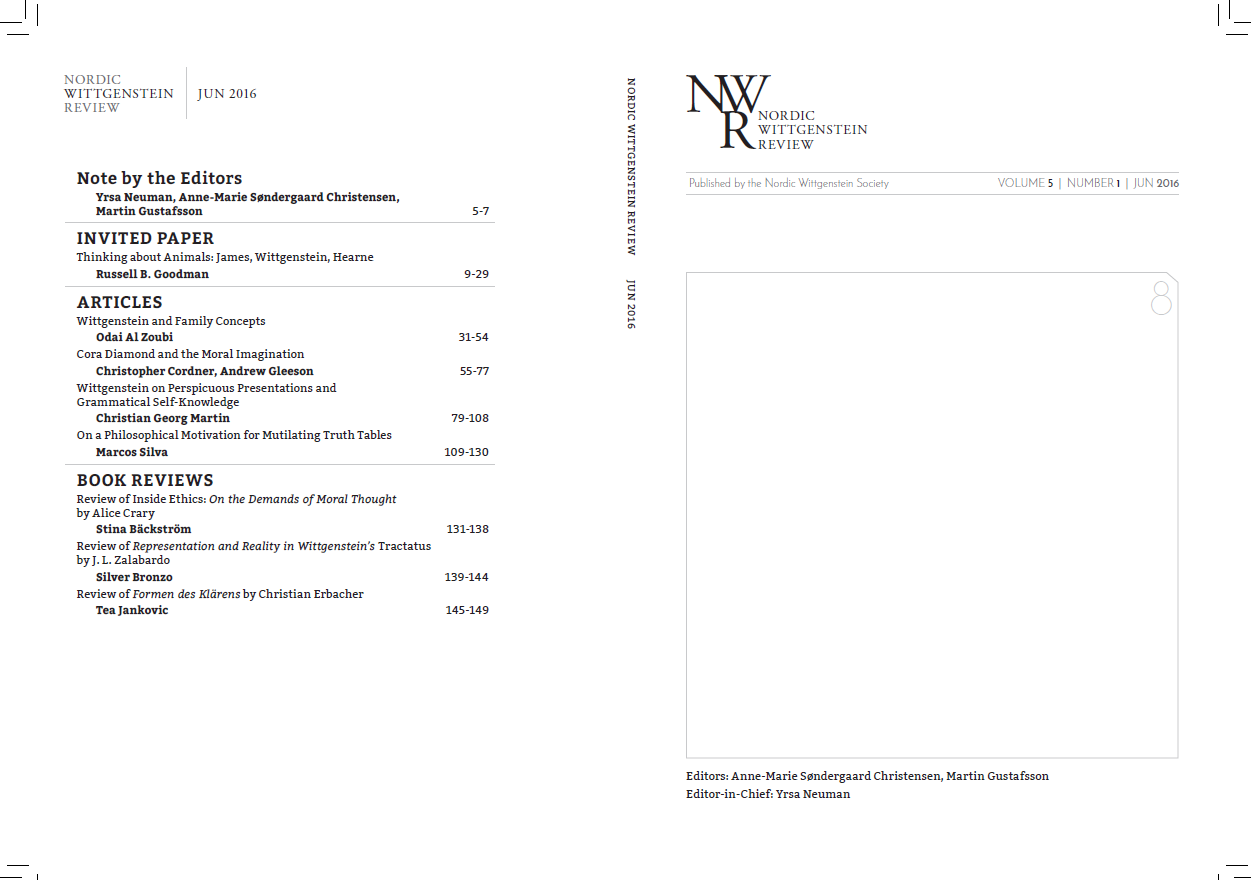On a Philosophical Motivation for Mutilating Truth Tables
Keywords:
Middle Wittgenstein, philosophy of logic, philosophy of language, Wittgenstein Ludwig, colourAbstract
One of the reasons colours, or better the conceptual organisation of the colour system, could be relevant to the philosophy of logic is that they necessitate some mutilation of truth tables by restricting truth functionality. This paper argues that the so-called ‘Colour Exclusion Problem’, the first great challenge for Wittgenstein’s Tractatus, is a legitimate philosophical motivation for a systematic mutilation of truth tables. It shows how one can express, through these mutilations, some intensional logical relations usually expressed by the Aristotelian Square of Oppositions, as contrariety and subcontrariety.References
Anellis, Irving, 2004. “The genesis of the truth-table device”. Russell: the Journal of the Russell Archives 24: 55–70.
Anellis, Irving, 2012. “Peirce’s Truth-functional Analysis and the Origin of the Truth Table”. History and Philosophy of Logic 33: 87-97.
Beziau, J-Y. & Jacquette, D. (eds), 2012. Around and Beyond the Square of Opposition. Basel: Birkhäuser, pp.6-24.
Brandom, Robert, 2008. Between Saying and Doing: Towards an Analytic Pragmatism. New York: Oxford University Press.
Engelmann, Mauro, 2013. Wittgenstein’s Philosophical Development: Phenomenology, Grammar, Method and the Anthropological View. Hampshire: Palgrave Macmillan.
Dreben, B. & Floyd, J., 1991. “Tautology: how not to use a word”. In: Wittgenstein in Florida: Proceedings of the Colloquium on the Philosophy of Ludwig Wittgenstein, Florida State University, August 7-8, 1989. Hintikka, Jaakko (Ed.).
Frege, Gottlob, 1918. “Der Gedanke, eine logische Untersuchung”. In: Logische Untersuchungen. Edited by Günther Patzig. Göttingen: Kleine Vandenhoeck-Reihe, 1986.
Goddard, L, 1960. “The exclusive ‘or’”. Analysis 20(5): 97-105.
Hacker, Peter, 1972. Insight and Illusion. Oxford: Blackwell.
Horn, Laurence R. and Wansing, Heinrich, 2015. “Negation”, The Stanford Encyclopedia of Philosophy (Spring 2015 Edition), Edward N. Zalta (ed.), forthcoming. <http://plato.stanford.edu/archives/spr2015/entries/negation/>
Jacquette, Dale, 1990. “Wittgenstein and the Color Incompatibility Problem”. History of Philosophy Quarterly 7(3):353 - 365
Moss, Sarah, 2012 “Solving the Color Incompatibility Problem”. Journal of Philosophical Logic, 41:841–851.
Prado Neto, Bento, 2003. Fenomenologia em Wittgenstein: tempo, cor e figuração. Rio de Janeiro: Editora UFRJ.
Post, Emil, 1921. “Introduction to the general theory of elementary propositions”. American Journal Mathematics, 43.
Ramsey, Frank, 1923. “Critical Notes to Tractatus Logico-Philosophicus”. Mind, 32: 465-478.
Russell, Bertrand, 1905. “On Denoting”. Mind, 14, 479–493.
Russell, Bertrand, 1956. The Philosophy of Logic Atomism. In: Logic and Knowledge, London: Allen and Unwin, 1956, 177–281.
Silva, Marcos, 2014. “Two Forms of Exclusion Mean Two Different Negations”. Philosophical Investigations. Forthcoming.
Spiegelberg, H., 1981 [1968]. The Puzzle of Wittgenstein's Phänomenologie (1929-?) (with Supplement 1979). In H. Spiegelberg, The Context of the Phenomenological Movement, The Hague: Nijhoff: 202-228.
von Wright, Georg Henrik, 1996. “On Colour: a logic-philosophical Fantasy”. In: Six Essays in Philosophical Logic. Acta Philosophica Fennica. Vol. 60, Helsinki: 9-16.
Young, R.A, 2004. “Wittgenstein’s Tractatus Project as Philosophy of Information”. Minds and Machines 14: 119–132.
Waismann, Friedrich, 1984. Wittgenstein und der Wiener Kreis. Werkausgabe Band 3. Frankfurt am Main: Suhrkamp.
Wittgenstein, Ludwig, 2000. Nachlass: The Bergen Electronic Edition. Oxford: Oxford UP.
Wittgenstein, Ludwig, 1975. Philosophical Remarks. Trans. by Raymond Hargreaves and Roger White. Basil Blackwell: Oxford.
Wittgenstein, Ludwig. 1929. “Some Remarks on Logical Form”. Proceedings of the Aristotelian Society, Supplementary Volumes, Vol. 9, Knowledge, Experience and Realism, pp. 162-171 Published by: Blackwell Publishing on behalf of The Aristotelian Society.
Wittgenstein Ludwig, 1984. Tractatus Logico-philosophicus. Tagebücher 1914-16. Philosophische Untersuchungen. Werkausgabe Band 1. Frankfurt am Main: Suhrkamp.
Wittgenstein Ludwig, 1994. Wiener Ausgabe. Band I. Wien: Springer.
Downloads
Published
Issue
Section
License
NWR uses the Creative Commons license CC-BY.
Vol. 1-3 used CC-BY-NC-SA. The collected works copyright ownership for Vol. 1-2 were shared by Nordic Wittgenstein Society and ontos Verlag/De Gruyter.









